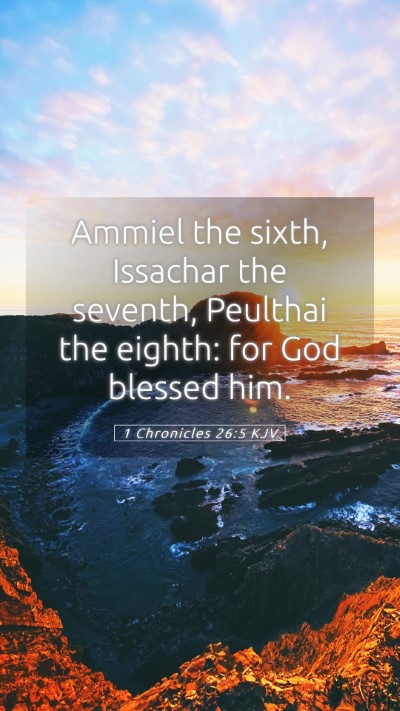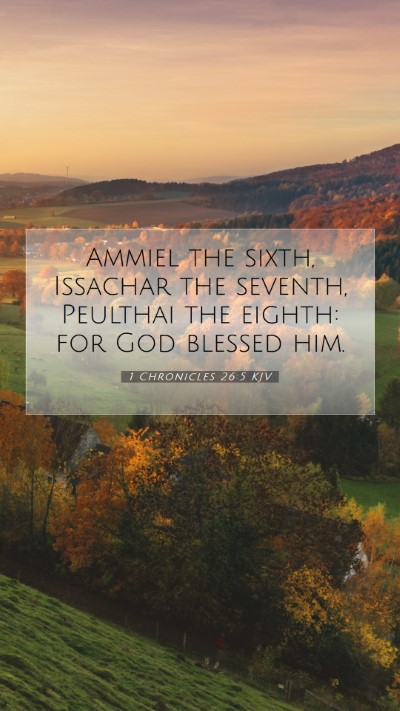Bible Verse Meaning and Commentary for 1 Chronicles 26:5
In 1 Chronicles 26:5, we encounter a passage that reflects on the organization and roles of the gatekeepers in the temple service. This verse states:
"The son of Obed-edom; Shemaiah, the firstborn; Jehozabad the second; Joah the third; and Saccar the fourth."
Through this brief genealogy, we gain insights into the structure of temple service and the significance of families in maintaining worship.
Insights and Analysis
This verse highlights the importance of leadership and order during temple worship. In examining the commentary by prominent biblical scholars, we uncover profound meanings and interpretations of this seemingly straightforward text.
Commentary Summaries
-
Matthew Henry:
Henry points out that the lineage of gatekeepers signifies the importance of divine order in the temple. The roles assigned to families, like that of Obed-edom, illustrate that service in God’s house is both a privilege and duty, demanding faithfulness.
-
Albert Barnes:
Barnes emphasizes the significance of the order of the names mentioned in this verse. Each individual not only holds a position but also represents a part of the whole community dedicated to worship. This illustrates the unity of the people in their service to God.
-
Adam Clarke:
Clarke notes that the roles assigned to the children of Obed-edom highlight the hereditary nature of priestly and Levitical duties. This reflects God's design for the family structure in religious matters, promoting continuity and stability in worship.
Understanding the Context
The context of this verse lies within the broader accounts of David's organization of the Levites and their duties. Gatekeepers played a critical role in temple worship, ensuring that only the authorized entered, thus maintaining the sanctity of the sacred space.
Key Themes
- Order and Structure: The division of services and roles within the temple highlights the necessity for organization in worship.
- Service and Heritage: The mention of family lineages signifies that spiritual duties are often passed down, emphasizing the importance of generational faithfulness.
- Divine Selection: The specific inclusion of certain families indicates God's chosen method for maintaining order among His people.
Application of the Verse
The insights gathered from this verse can be applied to modern-day worship environments. Just as the gatekeepers maintained order, churches today require structure and organization to facilitate worship effectively.
Lessons for Today’s Believers
- Commitment to Service: Each member of a congregation should be encouraged to take on responsibilities, reflecting a commitment to their community of faith.
- Value of Heritage: Acknowledging the role of family and heritage in spiritual life can lead to a stronger sense of belonging and continuity in faith.
Related Bible Cross References
- 2 Chronicles 8:14 - Discusses the roles of the Levites in the temple service.
- 1 Chronicles 15:18 - Highlights the organization of the Levites and their duties.
- 1 Samuel 6:10-12 - The significance of Obed-edom’s household during the Ark's journey.
This comprehensive understanding of 1 Chronicles 26:5 serves as a testament to the rich tapestry of biblical teachings surrounding organization, duty, and community in worship. Through detailed commentary and analysis, believers can draw parallels to their lives and find meaning in service and obedience to God's structure for worship.


